Piano Sheet Music
 "... Ritchie Blackmore was a huge early influence on me, but after that I had to find my own way ... Johann Sebastian Bach was probably the most influential guy ever on me ... Vivaldi, Beethoven and eventually Paganini ... all of a sudden I was thinking in all these other areas, instead of blues riffs ..." Yngwie Malmsteen
"... Ritchie Blackmore was a huge early influence on me, but after that I had to find my own way ... Johann Sebastian Bach was probably the most influential guy ever on me ... Vivaldi, Beethoven and eventually Paganini ... all of a sudden I was thinking in all these other areas, instead of blues riffs ..." Yngwie Malmsteen
Dixie Chicks

The Dixie Chicks are a multiple Grammy Award-winning female alternative country band, composed of three women: Emily Robison, Martie Maguire and Natalie Maines. They are the highest-selling female musical group in any musical genre, having sold over 36 million albums as of May 2008.
The group formed in 1989 in Dallas, Texas, and was originally composed of four women performing bluegrass and country music, busking and touring the bluegrass festival circuits and small venues for six years, without attracting a major label. After the departure of one bandmate, the replacement of their lead singer, and a slight change in their repertoire, the Dixie Chicks achieved massive country and pop success, beginning in 1998 with hit songs such as "Wide Open Spaces", "Cowboy Take Me Away", and "Long Time Gone". The women became well-known for their independent spirit, instrumental virtuosity, thoughtful song compositions, fierce loyalty, and outspoken comments on controversial subjects, including politics.
Ten days before the 2003 invasion of Iraq, lead vocalist Natalie Maines said "they didn't want this war, this violence and that we're ashamed the President of the United States is from Texas". The ensuing controversy, by people who supported an invasion and war in Iraq, cost the group half of their concert audience attendance in the United States and led to charges of being un-American and death threats. As of 2008, they have won thirteen Grammy Awards, with five of them earned in 2007 including the coveted Grammy Award for Album of the Year for Taking The Long Way.
The group formed in 1989 in Dallas, Texas, and was originally composed of four women performing bluegrass and country music, busking and touring the bluegrass festival circuits and small venues for six years, without attracting a major label. After the departure of one bandmate, the replacement of their lead singer, and a slight change in their repertoire, the Dixie Chicks achieved massive country and pop success, beginning in 1998 with hit songs such as "Wide Open Spaces", "Cowboy Take Me Away", and "Long Time Gone". The women became well-known for their independent spirit, instrumental virtuosity, thoughtful song compositions, fierce loyalty, and outspoken comments on controversial subjects, including politics.
Ten days before the 2003 invasion of Iraq, lead vocalist Natalie Maines said "they didn't want this war, this violence and that we're ashamed the President of the United States is from Texas". The ensuing controversy, by people who supported an invasion and war in Iraq, cost the group half of their concert audience attendance in the United States and led to charges of being un-American and death threats. As of 2008, they have won thirteen Grammy Awards, with five of them earned in 2007 including the coveted Grammy Award for Album of the Year for Taking The Long Way.
Carrie Underwood

Carrie Marie Underwood (born March 10, 1983 in Muskogee, Oklahoma) is an American country singer-songwriter. She rose to fame as the winner of the fourth season of American Idol, and has become a multi-platinum selling recording artist and a multiple Grammy Award winner. Her debut album, Some Hearts, was certified seven times platinum and is the fastest selling debut country album in Nielsen SoundScan history.
Her second album, Carnival Ride, was released on October 23, 2007. It has so far sold about 2 million copies To date, Underwood has sold over 11 million records in the United States. Underwood was inducted as a member of the Grand Ole Opry on May 10, 2008.
Her second album, Carnival Ride, was released on October 23, 2007. It has so far sold about 2 million copies To date, Underwood has sold over 11 million records in the United States. Underwood was inducted as a member of the Grand Ole Opry on May 10, 2008.
Lee Ann Womack

Lee Ann Womack (born August 19, 1966) is a Grammy Award-winning American country-pop artist.
Best-known for her 2000 Country-Pop crossover hit, "I Hope You Dance", Womack has had three Gold albums and four Platinum albums, since breaking through in 1997 with her debut self-titled album. She has also won two Grammy awards and over five awards from the Country Music Association, as well as having numerous Top 10 and 20 Country hits.
Best-known for her 2000 Country-Pop crossover hit, "I Hope You Dance", Womack has had three Gold albums and four Platinum albums, since breaking through in 1997 with her debut self-titled album. She has also won two Grammy awards and over five awards from the Country Music Association, as well as having numerous Top 10 and 20 Country hits.
Faith Hill

Audrey Faith Perry McGraw, known professionally as Faith Hill (born September 21, 1967), is an American country and pop singer, known both for her commercial success and her marriage to fellow country star Tim McGraw. Hill's voice (described as both soulful and raspy) and careful song selection have helped her to sell more than 35 million records and accumulate eleven number-one singles on the Country charts.
Hill has been honored by the Country Music Association, the Academy of Country Music, the Grammy Awards, the American Music Awards and the People's Choice Awards. Her Soul2Soul II Tour 2006 with husband McGraw became the highest-grossing country tour of all time. In 2001 she was named one of the "30 Most Powerful Women in America" by Ladies Home Journal.
Hill has been honored by the Country Music Association, the Academy of Country Music, the Grammy Awards, the American Music Awards and the People's Choice Awards. Her Soul2Soul II Tour 2006 with husband McGraw became the highest-grossing country tour of all time. In 2001 she was named one of the "30 Most Powerful Women in America" by Ladies Home Journal.
Tim McGraw

Samuel Timothy "Tim" McGraw (born May 1, 1967) is an American country singer and actor. With many of his albums and singles topping the country music charts, Tim has achieved total album sales in excess of 40 million units. He is married to country singer Faith Hill and is the son of former baseball player Tug McGraw. His trademark hit songs include "Indian Outlaw", "Don't Take the Girl", "I Like It, I Love It", "Something Like That", "It's Your Love" (featuring his wife, Faith Hill), and "Live Like You Were Dying".
McGraw had eleven consecutive albums to debut at Number One on the Billboard albums charts; Thirty-one singles to hit number 1 on the Billboard Hot Country 100 chart; three singles named the #1 country song of the year; ("It's Your Love", "Just To See You Smile", and "Live Like You Were Dying") Won 3 Grammys, 14 Academy of Country Music awards, 11 Country Music Association (CMA) awards, 10 American Music Awards and 3 People's Choice Awards. Ranked as one of the top five in all genres of music, his Soul2Soul II tour with Faith Hill became the highest-grossing tour in country music history.
McGraw has ventured into acting, with a supporting role in the Billy Bob Thornton film Friday Night Lights, The Kingdom, and a lead role in 2006's Flicka. He is also a minority owner of the Arena Football League's Nashville Kats.
McGraw had eleven consecutive albums to debut at Number One on the Billboard albums charts; Thirty-one singles to hit number 1 on the Billboard Hot Country 100 chart; three singles named the #1 country song of the year; ("It's Your Love", "Just To See You Smile", and "Live Like You Were Dying") Won 3 Grammys, 14 Academy of Country Music awards, 11 Country Music Association (CMA) awards, 10 American Music Awards and 3 People's Choice Awards. Ranked as one of the top five in all genres of music, his Soul2Soul II tour with Faith Hill became the highest-grossing tour in country music history.
McGraw has ventured into acting, with a supporting role in the Billy Bob Thornton film Friday Night Lights, The Kingdom, and a lead role in 2006's Flicka. He is also a minority owner of the Arena Football League's Nashville Kats.
Chantal Kreviazuk
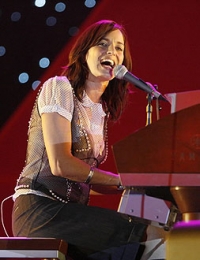
Chantal Kreviazuk (born May 18, 1974) is a Canadian singer-songwriter of the Adult contemporary music genre. She is also a classically trained pianist, and can play the guitar. She is of Ukrainian descent.
Kreviazuk's work has appeared on many soundtracks for films and television shows. In 1998, Kreviazuk scored her only international hit to date with a cover of "Leaving on a Jet Plane", a song written by John Denver and popularized by Peter, Paul & Mary. The song appeared on the soundtrack to the blockbuster film Armageddon and was that album's follow-up single to Aerosmith's "I Don't Want to Miss a Thing."
In 1999, Chantal recorded a cover of the Randy Newman ballad "Feels Like Home" for the Dawson's Creek soundtrack, as well as "How to Lose a Guy in Ten Days," and performed a cover version of The Beatles' "In My Life" for the television drama Providence.
Kreviazuk's work has appeared on many soundtracks for films and television shows. In 1998, Kreviazuk scored her only international hit to date with a cover of "Leaving on a Jet Plane", a song written by John Denver and popularized by Peter, Paul & Mary. The song appeared on the soundtrack to the blockbuster film Armageddon and was that album's follow-up single to Aerosmith's "I Don't Want to Miss a Thing."
In 1999, Chantal recorded a cover of the Randy Newman ballad "Feels Like Home" for the Dawson's Creek soundtrack, as well as "How to Lose a Guy in Ten Days," and performed a cover version of The Beatles' "In My Life" for the television drama Providence.
Keith Urban
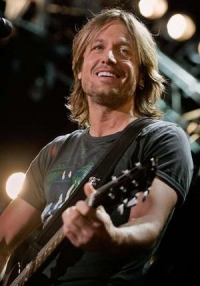
Keith Lionel Urban (born 26 October 1967 in Whangarei, New Zealand), is an Australian Grammy- and ARIA-winning country music singer. Urban began his career in Tamworth, Australia participating in Tamworth Country Music Festival, having moved there at an early age. In 1991, he released a self-titled debut album, and charted four singles in Australia before moving to the United States in 1992. Eventually, Urban found work as a session guitarist before founding a band known as The Ranch, which recorded one studio album on Capitol Records/EMI and charted one single on the Billboard country charts.
Still signed to Capitol/EMI, he made his solo American debut in 1999 with the album keith urban. Certified platinum in the U.S., it also produced his first American Number One in "But for the Grace of God". His breakthrough hit was the Number One "Somebody Like You", from his second Capitol album Golden Road (2002). This album also earned Urban his first Grammy Award win for "You'll Think of Me", its fourth single and the third Billboard Number One of his career. 2004's Be Here, his third American album, produced three more Number Ones, and became his highest-selling album, earning 4× Multi-Platinum certification. Love, Pain & the whole crazy thing was released in 2006, earning Urban's second Grammy for the song "Stupid Boy", while a Greatest Hits package entitled Greatest Hits: 18 Kids followed in late 2007. This album was re-released a year later as Greatest Hits: 19 Kids with one track added.
Urban has released a total of seven studio albums (one of which was released only in the United Kingdom), as well as one album in The Ranch. He has charted more than fifteen singles on the U.S. country charts, including eight Number Ones. A multi-instrumentalist, Urban plays acoustic and electric guitar, as well as ganjo,bass guitar, mandolin, piano, bouzouki, and percussion.
Still signed to Capitol/EMI, he made his solo American debut in 1999 with the album keith urban. Certified platinum in the U.S., it also produced his first American Number One in "But for the Grace of God". His breakthrough hit was the Number One "Somebody Like You", from his second Capitol album Golden Road (2002). This album also earned Urban his first Grammy Award win for "You'll Think of Me", its fourth single and the third Billboard Number One of his career. 2004's Be Here, his third American album, produced three more Number Ones, and became his highest-selling album, earning 4× Multi-Platinum certification. Love, Pain & the whole crazy thing was released in 2006, earning Urban's second Grammy for the song "Stupid Boy", while a Greatest Hits package entitled Greatest Hits: 18 Kids followed in late 2007. This album was re-released a year later as Greatest Hits: 19 Kids with one track added.
Urban has released a total of seven studio albums (one of which was released only in the United Kingdom), as well as one album in The Ranch. He has charted more than fifteen singles on the U.S. country charts, including eight Number Ones. A multi-instrumentalist, Urban plays acoustic and electric guitar, as well as ganjo,bass guitar, mandolin, piano, bouzouki, and percussion.
Collin Raye

Collin Raye (born Floyd Collin Wray, August 22, 1959 or 1960, in De Queen, Arkansas, USA) is an American country music singer. He made his debut on the American country music scene in 1991 with the release of his debut album All I Can Be, which produced his first Number One hit in "Love, Me". All I Can Be was the first of four consecutive albums released by Raye to achieve RIAA platinum certification in the United States for sales of one million copies each.
Throughout the 1990s, Collin continued to produce Top Ten singles on the country music charts. By the end of the decade, however, his momentum had slowed; 2001's Can't Back Down was his first album that did not produce a Top 40 country hit, and he was dropped by his record label soon afterward. He did not record another studio album until 2005's Twenty Years and Change, released on an independent label.
Between 1991 and the present, Raye has charted thirty singles on the U.S. country charts; he has also charted twice on the Adult Contemporary format as a duet partner on two Jim Brickman songs. Four of Raye's singles have reached Number One on the Billboard country music charts: 1992's "Love, Me" and "In This Life", 1994's "My Kind of Girl", and 1998's "I Can Still Feel You". He has also recorded a total of eleven studio albums, counting a Christmas album and a compilation of lullabies, in addition to releasing a Greatest Hits compilation, a live album, and a live CD/DVD package. His most recent compilation, an EP titled Selected Hits, was released in 2007.
Throughout the 1990s, Collin continued to produce Top Ten singles on the country music charts. By the end of the decade, however, his momentum had slowed; 2001's Can't Back Down was his first album that did not produce a Top 40 country hit, and he was dropped by his record label soon afterward. He did not record another studio album until 2005's Twenty Years and Change, released on an independent label.
Between 1991 and the present, Raye has charted thirty singles on the U.S. country charts; he has also charted twice on the Adult Contemporary format as a duet partner on two Jim Brickman songs. Four of Raye's singles have reached Number One on the Billboard country music charts: 1992's "Love, Me" and "In This Life", 1994's "My Kind of Girl", and 1998's "I Can Still Feel You". He has also recorded a total of eleven studio albums, counting a Christmas album and a compilation of lullabies, in addition to releasing a Greatest Hits compilation, a live album, and a live CD/DVD package. His most recent compilation, an EP titled Selected Hits, was released in 2007.
Harry Potter and the Chamber of Secrets
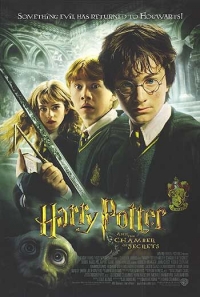
Harry Potter and the Chamber of Secrets is a 2002 fantasy adventure film, and the second film in the popular Harry Potter series, based on the novel by J. K. Rowling, Harry Potter and the Chamber of Secrets. The film was released on 15 November 2002 in the UK and US and 28 November in AUS (exactly three weeks after the death of Richard Harris, who portrayed Albus Dumbledore and from the first film) and was directed by returning director, Chris Columbus. The screenplay was adapted by returning screenwriter, Steven Kloves and David Heyman returns from the first film as the producer.
Most of the major cast and crew from Philosopher's Stone (also known as Sorcerer's Stone) returned for Chamber of Secrets, including child stars Daniel Radcliffe, Emma Watson, Rupert Grint and director Chris Columbus. However, it was the last appearance by Richard Harris as Dumbledore (and also Harris's last film) and the last Harry Potter film directed by Columbus. New key actors included Kenneth Branagh as Gilderoy Lockhart and Jason Isaacs as Lucius Malfoy.
The film was very well received at the box office making $879 million USD worldwide became number two of the year. The film was nominated for three BAFTA Film Awards in 2003.
Most of the major cast and crew from Philosopher's Stone (also known as Sorcerer's Stone) returned for Chamber of Secrets, including child stars Daniel Radcliffe, Emma Watson, Rupert Grint and director Chris Columbus. However, it was the last appearance by Richard Harris as Dumbledore (and also Harris's last film) and the last Harry Potter film directed by Columbus. New key actors included Kenneth Branagh as Gilderoy Lockhart and Jason Isaacs as Lucius Malfoy.
The film was very well received at the box office making $879 million USD worldwide became number two of the year. The film was nominated for three BAFTA Film Awards in 2003.
Harry Potter and the Prisoner of Azkaban
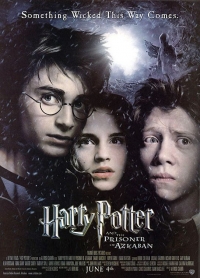
Harry Potter and the Prisoner of Azkaban is a 2004 fantasy adventure film, based on the novel of the same name by J. K. Rowling. Directed by Alfonso Cuarón, it is the third film in the popular Harry Potter series. It stars Daniel Radcliffe as the teenage wizard Harry Potter, and Rupert Grint and Emma Watson as Harry's best friends Ron Weasley and Hermione Granger. Gary Oldman and David Thewlis joined the cast as the new characters Sirius Black and Remus Lupin. In this movie, the role of Albus Dumbledore was played by Michael Gambon who took over from the late Richard Harris who died of Hodgkin's disease. Steve Kloves returned as screenwriter, while Chris Columbus (the director of the previous two films) became a producer, alongside David Heyman. The film was released on 31 May 2004 in the United Kingdom and on 4 June 2004 in the United States as the first film released into IMAX theaters.
The film was nominated for two Academy Awards — Academy Award for Original Music Score and Academy Award for Visual Effects at the 77th Academy Awards held in 2005.
The film was nominated for two Academy Awards — Academy Award for Original Music Score and Academy Award for Visual Effects at the 77th Academy Awards held in 2005.
Harry Potter and the Goblet of Fire
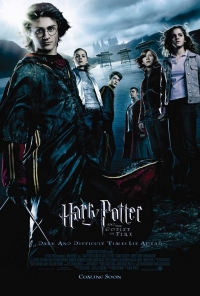
Harry Potter and the Goblet of Fire is a 2005 fantasy adventure film, based on J. K. Rowling's novel of the same name, and is the fourth film in the popular Harry Potter series.
Directed by Mike Newell (after replacing from Alfonso Cuarón from Prisoner of Azkaban, the third film of the series), the film concerns Harry Potter's fourth year at Hogwarts School of Witchcraft and Wizardry. Hogwarts has been selected to hold the recently returning wizard competition known as the Triwizard Tournament. Though Harry does not apply, the Goblet of Fire mysteriously selects him as a second representative of Hogwarts in the tournament.
Three days after its release, the film had grossed over US$102 million at the North American box office, the highest first-weekend tally for a Harry Potter film, and enjoyed an immensely successful run at the box office, earning over $896 million worldwide, making it the highest grossing film of 2005 and the 8th-highest grossing film of all time. It was the third highest grossing film in the U.S. for 2005 making $290 million. It is currently the unadjusted 12th highest-grossing film of all time. The DVD went on to become the fastest selling DVD of all time. It is currently the third-highest grossing Harry Potter film, behind Harry Potter and the Philosopher's Stone and Harry Potter and the Order of the Phoenix.
The film was nominated for an Academy Award for Best Art Direction, but lost to Memoirs of a Geisha.
This was also the first Harry Potter film to receive a "12a" in the UK and "PG-13" rating in the US or its international equivalents (for sequences of fantasy violence and frightening images), the preceding films having been rated PG or its international equivalents and the second film to release in IMAX theaters.
Directed by Mike Newell (after replacing from Alfonso Cuarón from Prisoner of Azkaban, the third film of the series), the film concerns Harry Potter's fourth year at Hogwarts School of Witchcraft and Wizardry. Hogwarts has been selected to hold the recently returning wizard competition known as the Triwizard Tournament. Though Harry does not apply, the Goblet of Fire mysteriously selects him as a second representative of Hogwarts in the tournament.
Three days after its release, the film had grossed over US$102 million at the North American box office, the highest first-weekend tally for a Harry Potter film, and enjoyed an immensely successful run at the box office, earning over $896 million worldwide, making it the highest grossing film of 2005 and the 8th-highest grossing film of all time. It was the third highest grossing film in the U.S. for 2005 making $290 million. It is currently the unadjusted 12th highest-grossing film of all time. The DVD went on to become the fastest selling DVD of all time. It is currently the third-highest grossing Harry Potter film, behind Harry Potter and the Philosopher's Stone and Harry Potter and the Order of the Phoenix.
The film was nominated for an Academy Award for Best Art Direction, but lost to Memoirs of a Geisha.
This was also the first Harry Potter film to receive a "12a" in the UK and "PG-13" rating in the US or its international equivalents (for sequences of fantasy violence and frightening images), the preceding films having been rated PG or its international equivalents and the second film to release in IMAX theaters.
Jon Schmidt

Jon Schmidt (born 1966) is an American pianist, composer, piano teacher, and author. Classically trained, he branched into New Age music in his 20s and has developed a classical crossover style that blends classical, contemporary, and rock and roll. He has released eight solo albums and seven piano books containing original scores. Since 2010 he has been a member of The Piano Guys musical group, performing on their YouTube videos, albums, and in concert.
Elvis Presley

Elvis Aaron Presley (January 8, 1935–August 16, 1977, middle name sometimes written Aron)a was an American singer, musician and actor. A cultural icon, he is commonly referred to as the "The King of Rock 'n' Roll" or "The King".
In 1954, Presley began his career as the first performer of rockabilly, an uptempo fusion of country and rhythm and blues with a strong back beat. His novel versions of existing songs, mixing "black" and "white" sounds, made him popular—and controversial—as did his uninhibited stage and television performances. He recorded songs in the rock and roll genre, with tracks like "Hound Dog" and "Jailhouse Rock" later embodying the style. Presley had a versatile voice and had unusually wide success encompassing other genres, including gospel, blues, ballads and pop. To date, he has been inducted into four music halls of fame.
In the 1960s, Presley made the majority of his thirty-one movies—mainly poorly reviewed, but financially successful, musicals. In 1968, he returned with acclaim to live music in a television special, and thereafter performed across the U.S., notably in Las Vegas. Throughout his career, he set records for concert attendance, television ratings and recordings sales. He is one of the best-selling and most influential artists in the history of popular music. Health problems, drug dependency and other factors led to his premature death at age 42.
In 1954, Presley began his career as the first performer of rockabilly, an uptempo fusion of country and rhythm and blues with a strong back beat. His novel versions of existing songs, mixing "black" and "white" sounds, made him popular—and controversial—as did his uninhibited stage and television performances. He recorded songs in the rock and roll genre, with tracks like "Hound Dog" and "Jailhouse Rock" later embodying the style. Presley had a versatile voice and had unusually wide success encompassing other genres, including gospel, blues, ballads and pop. To date, he has been inducted into four music halls of fame.
In the 1960s, Presley made the majority of his thirty-one movies—mainly poorly reviewed, but financially successful, musicals. In 1968, he returned with acclaim to live music in a television special, and thereafter performed across the U.S., notably in Las Vegas. Throughout his career, he set records for concert attendance, television ratings and recordings sales. He is one of the best-selling and most influential artists in the history of popular music. Health problems, drug dependency and other factors led to his premature death at age 42.
Peanuts

Peanuts is a syndicated daily and Sunday American comic strip written and illustrated by Charles M. Schulz, which ran from October 2, 1950, to February 13, 2000, continuing in reruns afterward. The strip is the most popular and influential in the history of the comic strip, with 17,897 strips published in all, Reprints of the strip are still syndicated and run in almost every U.S. newspaper.
Peanuts achieved extreme success for its television specials, several of which, including A Charlie Brown Christmas won or were nominated for Emmy Awards. The holiday specials remain quite popular and are currently broadcast on ABC in the United States during the corresponding season. The property is also a landmark in theatre with the stage musical You're a Good Man, Charlie Brown being an extremely successful and often-performed production.
Peanuts achieved extreme success for its television specials, several of which, including A Charlie Brown Christmas won or were nominated for Emmy Awards. The holiday specials remain quite popular and are currently broadcast on ABC in the United States during the corresponding season. The property is also a landmark in theatre with the stage musical You're a Good Man, Charlie Brown being an extremely successful and often-performed production.
Pokemon

Pokémon, also known as Pocket Monsters in Japan, is a Japanese media franchise managed by The Pokémon Company, a company founded by Nintendo, Game Freak, and Creatures. The franchise was created by Satoshi Tajiri in 1995, and is centered on fictional creatures called "Pokémon", which humans, known as Pokémon Trainers, catch and train to battle each other for sport. Works within the franchise are set in the Pokémon universe. The English slogan for the franchise is "Gotta Catch 'Em All".
Michael Buble

Michael Steven Bublé (born 9 September 1975) is a Canadian big band singer. He won several awards, including a Grammy and multiple Juno Awards. While achieving modest chart success in the United States, his 2003 self-titled album has reached the top ten in Lebanon, the UK and his home country. However, he did find commercial success in the U.S. with his 2005 album It's Time. He has sold over 18 million albums. Michael has also appeared on the TV series Rove four times.
The album Michael Bublé was released by Warner Bros. Records just before Valentine's Day in 2003. The album was actually first released by the Warner company in South Africa, where the album went into the Top 5 and was certified Gold. Soon after that, it entered the Canadian album charts. As success in the USA was marginal at best, Bublé started visiting countries all over the world, with the album being successful in places like the Philippines and Singapore. He then moved on to placed like Italy and eventually had chart success in the UK, U.S., Australia and elsewhere soon followed with the album going Platinum and reaching the top ten of the album charts in the UK and Canada and going all the way to #1 in Australia. The album has reached the top 50 of the Billboard 200 album charts in the U.S. His version of George Michael's "Kissing a Fool" was released as a single from the album and reached the top 30 of the Billboard Hot Adult Contemporary Tracks chart. "How Can You Mend a Broken Heart?" reached the top 30 of the Billboard Adult Contemporary chart as well. His third single "Sway" also reached the top 30 of the Adult Contemporary chart, while a Junkie XL remix of the song reached the top 20 in Australia in May 2004.
Bublé's second studio album, It's Time, debuted as a hugely successful performance. The album reached number 7 on the Billboard 200 album chart and number 2 on the ARIA Album Charts in Australia. It's Time also debuted at number 4 on the UK Album Charts. The album features covers of Beatles and Ray Charles songs, and the hit single "Home".
The album Michael Bublé was released by Warner Bros. Records just before Valentine's Day in 2003. The album was actually first released by the Warner company in South Africa, where the album went into the Top 5 and was certified Gold. Soon after that, it entered the Canadian album charts. As success in the USA was marginal at best, Bublé started visiting countries all over the world, with the album being successful in places like the Philippines and Singapore. He then moved on to placed like Italy and eventually had chart success in the UK, U.S., Australia and elsewhere soon followed with the album going Platinum and reaching the top ten of the album charts in the UK and Canada and going all the way to #1 in Australia. The album has reached the top 50 of the Billboard 200 album charts in the U.S. His version of George Michael's "Kissing a Fool" was released as a single from the album and reached the top 30 of the Billboard Hot Adult Contemporary Tracks chart. "How Can You Mend a Broken Heart?" reached the top 30 of the Billboard Adult Contemporary chart as well. His third single "Sway" also reached the top 30 of the Adult Contemporary chart, while a Junkie XL remix of the song reached the top 20 in Australia in May 2004.
Bublé's second studio album, It's Time, debuted as a hugely successful performance. The album reached number 7 on the Billboard 200 album chart and number 2 on the ARIA Album Charts in Australia. It's Time also debuted at number 4 on the UK Album Charts. The album features covers of Beatles and Ray Charles songs, and the hit single "Home".
South Pacific

South Pacific is a 1958 American romantic musical film based on the 1949 Rodgers and Hammerstein musical South Pacific, which in turn is loosely based on James A. Michener's 1947 short-story collection Tales of the South Pacific. The film, directed by Joshua Logan, stars Rossano Brazzi, Mitzi Gaynor, John Kerr and Ray Walston in the leading roles with Juanita Hall as Bloody Mary, the part that she had played in the original stage production. The film was nominated for three Academy Awards, winning the Academy Award for Best Sound for Fred Hynes.
The Simpsons

The Simpsons is an American animated sitcom which was created by Matt Groening for the Fox Broadcasting Company. It is a satirical parody of the middle class American lifestyle epitomized by its titular family, which consists of Homer, Marge, Bart, Lisa, and Maggie. The show is set in the fictional town of Springfield, and it lampoons many aspects of the human condition, as well as American culture, society as a whole, and television itself.
The family was conceived by Groening shortly before a pitch for a series of animated shorts with the producer James L. Brooks. Groening created a dysfunctional family and named the characters after members of his own family, substituting Bart for his own name. The shorts became a part of The Tracey Ullman Show on April 19, 1987. After a three-season run, the sketch was developed into a half-hour prime time show and was an early hit for Fox, becoming the first Fox series to land in the Top 30 ratings in a season (1992-1993).
Since its debut on December 17, 1989, the show has broadcast 420 episodes and the twentieth season will commence airing in on September 28, 2008. The Simpsons Movie, a feature-length film, was released in theaters worldwide on July 26 and July 27, 2007, and has grossed approximately US$526.2 million worldwide to date.
The Simpsons has won dozens of awards since it debuted as a series, including 24 Emmy Awards, 26 Annie Awards and a Peabody Award. Time magazine's December 31, 1999 issue named it the 20th century's best television series, and on January 14, 2000 it was awarded a star on the Hollywood Walk of Fame. The Simpsons is the longest-running American sitcom and the longest-running American animated program. Homer's annoyed grunt "D'oh!" has been adopted into the English lexicon, while The Simpsons has influenced many adult-oriented animated sitcoms.
The series' distinctive theme song was composed by musician Danny Elfman in 1989, after Groening approached him requesting a retro style piece. This piece, which took two days to create, has been noted by Elfman as the most popular of his career.
The family was conceived by Groening shortly before a pitch for a series of animated shorts with the producer James L. Brooks. Groening created a dysfunctional family and named the characters after members of his own family, substituting Bart for his own name. The shorts became a part of The Tracey Ullman Show on April 19, 1987. After a three-season run, the sketch was developed into a half-hour prime time show and was an early hit for Fox, becoming the first Fox series to land in the Top 30 ratings in a season (1992-1993).
Since its debut on December 17, 1989, the show has broadcast 420 episodes and the twentieth season will commence airing in on September 28, 2008. The Simpsons Movie, a feature-length film, was released in theaters worldwide on July 26 and July 27, 2007, and has grossed approximately US$526.2 million worldwide to date.
The Simpsons has won dozens of awards since it debuted as a series, including 24 Emmy Awards, 26 Annie Awards and a Peabody Award. Time magazine's December 31, 1999 issue named it the 20th century's best television series, and on January 14, 2000 it was awarded a star on the Hollywood Walk of Fame. The Simpsons is the longest-running American sitcom and the longest-running American animated program. Homer's annoyed grunt "D'oh!" has been adopted into the English lexicon, while The Simpsons has influenced many adult-oriented animated sitcoms.
The series' distinctive theme song was composed by musician Danny Elfman in 1989, after Groening approached him requesting a retro style piece. This piece, which took two days to create, has been noted by Elfman as the most popular of his career.
Tammy And The Bachelor
Tammy and the Bachelor is a 1957 romantic comedy film directed by Joseph Pevney and starring Debbie Reynolds as Tambrey "Tammy" Tyree, Walter Brennan as Grandpa Dinwitty and Leslie Nielsen as Peter Brent. It is the first of the four Tammy films.
Sarah McLachlan

Sarah Ann McLachlan, OC, OBC (born January 28, 1968) is a Grammy-winning Canadian musician, singer and songwriter.
She is known for the emotional sound of her ballads. Some of her most popular songs include "Angel", "Building a Mystery", "Adia", "Possession", "Fallen", "I Will Remember You", and "World on Fire". As of 2006, she has sold over 40 million albums worldwide. Her best-selling album to date is Surfacing, for which she won eight Juno Awards and three Grammy Awards. In addition to her personal artistic efforts, she founded the Lilith Fair tour, which showcased female musicians in the late 1990s.
Her 1991 album, Solace, was her mainstream breakthrough in Canada, spawning the hit singles "The Path of Thorns (Terms)" and "Into the Fire". Solace also marked the beginning of her partnership with Pierre Marchand. Marchand and McLachlan have been collaborators ever since, with Marchand producing all of McLachlan's albums and occasionally co-writing songs.
1994's Fumbling Towards Ecstasy was an immediate smash hit in Canada. From her Nettwerk connection, her piano version of the song "Possession" was included on the first Due South soundtrack in 1996. Over the next two years, Fumbling Towards Ecstasy quietly became McLachlan's international breakthrough as well, scaling the charts in a number of countries.
Following the success from Fumbling Towards Ecstasy, McLachlan returned in 1997 with Surfacing, her best selling album to date. Earning her two Grammy awards and four Junos, the album has since sold over 11 million copies worldwide and brought her much international success
She is known for the emotional sound of her ballads. Some of her most popular songs include "Angel", "Building a Mystery", "Adia", "Possession", "Fallen", "I Will Remember You", and "World on Fire". As of 2006, she has sold over 40 million albums worldwide. Her best-selling album to date is Surfacing, for which she won eight Juno Awards and three Grammy Awards. In addition to her personal artistic efforts, she founded the Lilith Fair tour, which showcased female musicians in the late 1990s.
Her 1991 album, Solace, was her mainstream breakthrough in Canada, spawning the hit singles "The Path of Thorns (Terms)" and "Into the Fire". Solace also marked the beginning of her partnership with Pierre Marchand. Marchand and McLachlan have been collaborators ever since, with Marchand producing all of McLachlan's albums and occasionally co-writing songs.
1994's Fumbling Towards Ecstasy was an immediate smash hit in Canada. From her Nettwerk connection, her piano version of the song "Possession" was included on the first Due South soundtrack in 1996. Over the next two years, Fumbling Towards Ecstasy quietly became McLachlan's international breakthrough as well, scaling the charts in a number of countries.
Following the success from Fumbling Towards Ecstasy, McLachlan returned in 1997 with Surfacing, her best selling album to date. Earning her two Grammy awards and four Junos, the album has since sold over 11 million copies worldwide and brought her much international success
Ghost
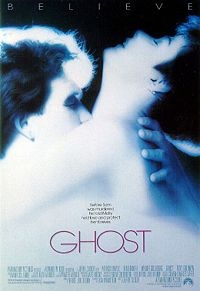
Ghost is a 1990 romantic drama-fantasy-thriller film starring Patrick Swayze, Demi Moore, Tony Goldwyn and Whoopi Goldberg, written by Bruce Joel Rubin and directed by Jerry Zucker. It was nominated for multiple Academy Awards, including Best Picture, winning for Best Original Screenplay, as well as Best Supporting Actress for Whoopi Goldberg.
My Sassy Girl

Vicious Darling is a 2001 South Korean romantic comedy. The story is based on the love letters written by Kim Ho-sik, directed and written by Kwak Jae-yong
The Wedding Singer
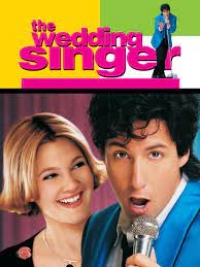
The Wedding Singer is a musical with music by Matthew Sklar, lyrics by Chad Beguelin, and a book by Beguelin and Tim Herlihy. It is based on the 1998 film of the same name.
A Man Could Get Killed
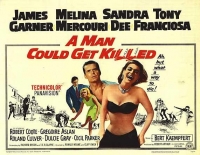
A Man Could Get Killed is a 1966 adventure comedy film shot on location around the Mediterranean and starring James Garner, Melina Mercouri, Sandra Dee, Anthony Franciosa, and Robert Coote. The film was written by David E. Walker (from his novel Diamonds For Danger), Richard L. Breen, and T.E.B. Clarke, and directed by Ronald Neame and Cliff Owen.
Lionel Richie

Lionel Brockman Richie, Jr. (born June 20, 1949) is an Academy Award and Grammy award-winning American singer, songwriter, record producer, and occasional actor, who has sold more than 100 million records.
He released his self-titled debut in 1982. The album hit #3 on the music charts and sold over 4 million copies. His 1983 follow up album, Can't Slow Down, sold over twice as many copies and won the Grammy Award for the Album of the Year in 1984. His third album, Dancing on the Ceiling, which was released in 1986, spawned such hits as "Say You, Say Me", "Dancing on the Ceiling," and "Se La", but it also signified the end of his large commercial success.
In 2002, Richie's song "Running with the Night" was featured on the Rockstar North video game Grand Theft Auto: Vice City though the song was removed from later versions of the game. In 2004, he appeared on Canadian Idol as his songs were featured during a Canadian Idol week.
In November 2005, Lionel Richie performed with Kenny Rogers on a CMT Crossroads special. The show gave an informative insight into their friendship both in and out of the music world. Richie was also the headliner at a 2000 Fourth of July tribute concert with Fantasia Barrino at the Philadelphia Museum of Art. Richie released his eighth studio album entitled " Coming Home" on September 12, 2006. The first single of the album was "I Call It Love" and was premiered in July 2006, becoming his biggest hit in the U.S. in ten years. The album was an incredible success for Richie in the United States, peaking at #6. His adopted daughter Nicole Richie stars in the music video for this track.
On May 2, 2008, Lionel Richie was the 21st recipient of the George and Ira Gershwin Lifetime Achievement Award at UCLA's annual Spring Sing. In accepting the award, Richie said: "Forget about surviving 30 some odd years in the music business, Lionel Richie survived 27 years of Nicole Richie".
He released his self-titled debut in 1982. The album hit #3 on the music charts and sold over 4 million copies. His 1983 follow up album, Can't Slow Down, sold over twice as many copies and won the Grammy Award for the Album of the Year in 1984. His third album, Dancing on the Ceiling, which was released in 1986, spawned such hits as "Say You, Say Me", "Dancing on the Ceiling," and "Se La", but it also signified the end of his large commercial success.
In 2002, Richie's song "Running with the Night" was featured on the Rockstar North video game Grand Theft Auto: Vice City though the song was removed from later versions of the game. In 2004, he appeared on Canadian Idol as his songs were featured during a Canadian Idol week.
In November 2005, Lionel Richie performed with Kenny Rogers on a CMT Crossroads special. The show gave an informative insight into their friendship both in and out of the music world. Richie was also the headliner at a 2000 Fourth of July tribute concert with Fantasia Barrino at the Philadelphia Museum of Art. Richie released his eighth studio album entitled " Coming Home" on September 12, 2006. The first single of the album was "I Call It Love" and was premiered in July 2006, becoming his biggest hit in the U.S. in ten years. The album was an incredible success for Richie in the United States, peaking at #6. His adopted daughter Nicole Richie stars in the music video for this track.
On May 2, 2008, Lionel Richie was the 21st recipient of the George and Ira Gershwin Lifetime Achievement Award at UCLA's annual Spring Sing. In accepting the award, Richie said: "Forget about surviving 30 some odd years in the music business, Lionel Richie survived 27 years of Nicole Richie".
Eric Idle

Eric Idle (born 29 March 1943) is an English actor, author, comedian and musician. Idle is a former member of the British surreal comedy group Monty Python and the parody rock band The Rutles, and is the writer of the music and lyrics for the Broadway musical Spamalot (based on Monty Python and the Holy Grail).
Astor Piazzolla

Ástor Pantaleón Piazzolla (March 11, 1921 – July 4, 1992) was an Argentine tango composer and bandoneón player. His oeuvre revolutionized the traditional tango into a new style termed nuevo tango, incorporating elements from jazz and classical music. An excellent bandoneonist, he regularly performed his own compositions with different ensembles.
Piazzolla's nuevo tango was distinct from the traditional tango in its incorporation of elements of jazz, its use of extended harmonies and dissonance, its use of counterpoint, and its ventures into extended compositional forms. As Argentine psychoanalyst Carlos Kuri has pointed out, Piazzolla's fusion of tango with this wide range of other recognizable Western musical elements was so successful that it produced a new individual style transcending these influences. It is precisely this success, and individuality, that makes it hard to pin down where particular influences reside in his compositions, but some aspects are clear. The use of the passacaglia technique of a circulating bass line and harmonic sequence, invented and much used in 17th and 18th century baroque music but also central to the idea of jazz "changes", predominates in most of Piazzolla's mature compositions. Another clear reference to the baroque is the often complex and virtuosic counterpoint that sometimes follows strict fugal behavior but more often simply allows each performer in the group to assert his voice. A further technique that emphasises this sense of democracy and freedom among the musicians is improvisation that is borrowed from jazz in concept, but in practice involves a different vocabulary of scales and rhythms that stay within the parameters of the established tango sound-world. Pablo Ziegler has been particularly responsible for developing this aspect of the style both within Piazzolla's groups and since the composer's death.
Piazzolla's nuevo tango was distinct from the traditional tango in its incorporation of elements of jazz, its use of extended harmonies and dissonance, its use of counterpoint, and its ventures into extended compositional forms. As Argentine psychoanalyst Carlos Kuri has pointed out, Piazzolla's fusion of tango with this wide range of other recognizable Western musical elements was so successful that it produced a new individual style transcending these influences. It is precisely this success, and individuality, that makes it hard to pin down where particular influences reside in his compositions, but some aspects are clear. The use of the passacaglia technique of a circulating bass line and harmonic sequence, invented and much used in 17th and 18th century baroque music but also central to the idea of jazz "changes", predominates in most of Piazzolla's mature compositions. Another clear reference to the baroque is the often complex and virtuosic counterpoint that sometimes follows strict fugal behavior but more often simply allows each performer in the group to assert his voice. A further technique that emphasises this sense of democracy and freedom among the musicians is improvisation that is borrowed from jazz in concept, but in practice involves a different vocabulary of scales and rhythms that stay within the parameters of the established tango sound-world. Pablo Ziegler has been particularly responsible for developing this aspect of the style both within Piazzolla's groups and since the composer's death.
Bill Withers

Bill Withers (born July 4, 1938 in Slab Fork, West Virginia) is an American singer-songwriter who performed and recorded from the late 1960s until the mid 1980s. Some of his best-known songs are "Ain't No Sunshine," "Use Me," "Lovely Day," "Lean on Me", "Grandma's Hands" and "Just the Two of Us".
Brandy

Brandy Rayana Norwood (born February 11, 1979), known professionally as Brandy, is an American R&B singer-songwriter, record producer, actress, television entertainer, and film producer.
Born into a musical family in McComb, Mississippi and raised in Carson, California, Norwood first appeared in a supporting role on the short-lived ABC sitcom Thea in 1993. Her engagement led to her own star vehicle, successful UPN sitcom Moesha in 1996, and resulted into roles in the 1998 horror sequel I Still Know What You Did Last Summer, and the TV films Rodgers and Hammerstein's Cinderella (1997) and Double Platinum (1999), two of television's best rated special programs.
In 1993, she signed a recording contract with Atlantic, releasing her self-titled debut album a year after. Following a major success with Grammy Award-winning "The Boy Is Mine," a duet with singer Monica and her second album Never Say Never in 1998, a series of successful records established her as one of the most successful of the new breed of urban R&B female vocalists to emerge during the mid-to late 1990s. Her latest studio album, Human (2008), was her first efffort to be released on the Epic label after a label change in 2005.
The RIAA ranks Norwood as one of the best-selling female artists in American music history, having sold over 10.5 million copies of her five studio albums in the United States and over 25 million albums worldwide, to date. Additionally, she has won over 100 awards as a recording artist.
Born into a musical family in McComb, Mississippi and raised in Carson, California, Norwood first appeared in a supporting role on the short-lived ABC sitcom Thea in 1993. Her engagement led to her own star vehicle, successful UPN sitcom Moesha in 1996, and resulted into roles in the 1998 horror sequel I Still Know What You Did Last Summer, and the TV films Rodgers and Hammerstein's Cinderella (1997) and Double Platinum (1999), two of television's best rated special programs.
In 1993, she signed a recording contract with Atlantic, releasing her self-titled debut album a year after. Following a major success with Grammy Award-winning "The Boy Is Mine," a duet with singer Monica and her second album Never Say Never in 1998, a series of successful records established her as one of the most successful of the new breed of urban R&B female vocalists to emerge during the mid-to late 1990s. Her latest studio album, Human (2008), was her first efffort to be released on the Epic label after a label change in 2005.
The RIAA ranks Norwood as one of the best-selling female artists in American music history, having sold over 10.5 million copies of her five studio albums in the United States and over 25 million albums worldwide, to date. Additionally, she has won over 100 awards as a recording artist.
Charles Fox

Charles Fox (born October 30, 1940 in New York City), is a composer for film and television. His most heard compositions are probably the "love themes" (the sunshine pop musical backgrounds which accompanied every episode of the 1970s ABC-TV show Love, American Style), and the dramatic theme music to ABC's Wide World of Sports.
His career started by playing the piano for, composing and arranging for artists such as Ray Barretto, Joe Quijano and Tito Puente. He also wrote theme music and arranged for Skitch Henderson and the Tonight Show Orchestra. Fox worked under the banner of Bob Israel's Score Productions where he composed the themes for several Goodson-Todman game shows including The Match Game (NBC version), What's My Line? (syndicated version) and To Tell the Truth (lyrics by director Paul Alter). He co-composed the theme song for Love, American Style, along with Arnold Margolin. He also co-composed "Killing Me Softly with His Song" with Norman Gimbel in 1971, which was first recorded by Lori Lieberman. They later wrote the theme songs to films and programs such as Last American Hero ("I Got A Name", sung by Jim Croce), Happy Days, Laverne and Shirley, and The New Adventures of Wonder Woman.
His career started by playing the piano for, composing and arranging for artists such as Ray Barretto, Joe Quijano and Tito Puente. He also wrote theme music and arranged for Skitch Henderson and the Tonight Show Orchestra. Fox worked under the banner of Bob Israel's Score Productions where he composed the themes for several Goodson-Todman game shows including The Match Game (NBC version), What's My Line? (syndicated version) and To Tell the Truth (lyrics by director Paul Alter). He co-composed the theme song for Love, American Style, along with Arnold Margolin. He also co-composed "Killing Me Softly with His Song" with Norman Gimbel in 1971, which was first recorded by Lori Lieberman. They later wrote the theme songs to films and programs such as Last American Hero ("I Got A Name", sung by Jim Croce), Happy Days, Laverne and Shirley, and The New Adventures of Wonder Woman.
Wim Mertens

Wim Mertens (born 14 May 1953) is a Flemish Belgian composer, countertenor vocalist, pianist, guitarist, and musicologist.Mertens was born in Neerpelt, Belgium. He studied social and political science at the University of Leuven (graduating in 1975) and musicology at Ghent University; he also studied music theory and piano at the Ghent Conservatory and the Royal Conservatory of Brussels.
Bruce Hornsby
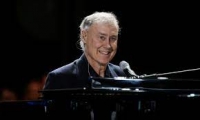
Bruce Randall Hornsby (born November 23, 1954) is an American singer-songwriter and pianist. He draws from classical, jazz, bluegrass, folk, Motown, gospel, rock, blues, and jam band musical traditions.His recordings have been recognized with industry awards, including the 1987 Grammy Award for Best New Artist with Bruce Hornsby and the Range, the 1990 Grammy Award for Best Bluegrass Album, and the 1994 Grammy Award for Best Pop Instrumental Performance.
Quincy Jones

Quincy Delight Jones Jr. (born March 14, 1933) is an American record producer, multi-instrumentalist, singer, composer, arranger, and film and television producer. His career spans over 60 years in the entertainment industry with a record 80 Grammy Award nominations, 28 Grammys, and a Grammy Legend Award in 1992.
Jones came to prominence in the 1950s as a jazz arranger and conductor, before moving on to work in pop music and film scores. In 1969 Jones and his songwriting partner Bob Russell became the first African-Americans to be nominated for an Academy Award for Best Original Song, for "The Eyes of Love" from the film Banning. Jones was also nominated for an Academy Award for Best Original Score for his work on the 1967 film In Cold Blood, making him the first African-American to be nominated twice in the same year. In 1971 he became the first African-American to be the musical director and conductor of the Academy Awards ceremony. In 1995 he was the first African-American to receive the Academy's Jean Hersholt Humanitarian Award. He has tied with sound designer Willie D. Burton as the second most Oscar-nominated African-American, with seven nominations each.
Jones came to prominence in the 1950s as a jazz arranger and conductor, before moving on to work in pop music and film scores. In 1969 Jones and his songwriting partner Bob Russell became the first African-Americans to be nominated for an Academy Award for Best Original Song, for "The Eyes of Love" from the film Banning. Jones was also nominated for an Academy Award for Best Original Score for his work on the 1967 film In Cold Blood, making him the first African-American to be nominated twice in the same year. In 1971 he became the first African-American to be the musical director and conductor of the Academy Awards ceremony. In 1995 he was the first African-American to receive the Academy's Jean Hersholt Humanitarian Award. He has tied with sound designer Willie D. Burton as the second most Oscar-nominated African-American, with seven nominations each.
Victor Carbajo
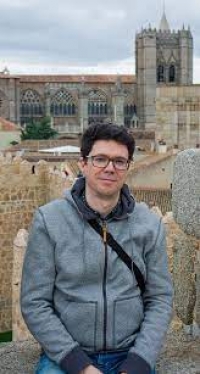
Compositor y pianista español nacido en Madrid en 1970. Cursó estudios musicales en el Real Conservatorio Superior de Música de su ciudad natal, donde se graduó como Profesor Superior de Armonía, Contrapunto, Composición e Instrumentación, con el Premio Fin de Carrera de Composición en 1993.
Albert Hammond
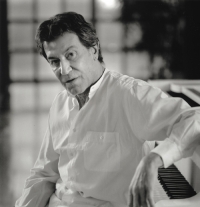
Albert Hammond (born 18 May 1944, London, England) is a Gibraltarian-British singer, songwriter and music producer. Hammond is one of the more successful pop/rock songwriters to come out of England during the 1960s and 1970s, and has also enjoyed a long career as a recording artist, his work popular in two languages on three continents across four decades.
"It Never Rains in Southern California" reached number five in the American Billboard Hot 100 chart and became a million-seller around the world, the first in a string of eight charting singles that Hammond enjoyed over the next five years. The accompanying album also introduced "Down by the River" and "If You Gotta Break Another Heart" — which was recorded by Cass Elliot in a slightly rewritten version — and "The Air That I Breathe." The latter was Hammond's favorite song on the album, and it was later to become the last major international hit by The Hollies (and that group's last significant U.S. single for more than a decade). Meanwhile, Hammond's follow-up album, The Free Electric Band (its title track salvaged from the unproduced musical), was nearly as impressive musically as its predecessor, although it sold far fewer copies without a huge hit to drive its sales. His next hit, "I'm a Train," came amid a flurry of activity surrounding Hammond's career. He produced records by Johnny Cash ("Praise the Lord and Pass the Soup"), collaborated with Richard Carpenter and John Bettis ("I Need to Be in Love"), wrote songs with Art Garfunkel, and, growing out of the latter project, recorded a self-titled third album produced by Garfunkel producer Roy Halee.
"It Never Rains in Southern California" reached number five in the American Billboard Hot 100 chart and became a million-seller around the world, the first in a string of eight charting singles that Hammond enjoyed over the next five years. The accompanying album also introduced "Down by the River" and "If You Gotta Break Another Heart" — which was recorded by Cass Elliot in a slightly rewritten version — and "The Air That I Breathe." The latter was Hammond's favorite song on the album, and it was later to become the last major international hit by The Hollies (and that group's last significant U.S. single for more than a decade). Meanwhile, Hammond's follow-up album, The Free Electric Band (its title track salvaged from the unproduced musical), was nearly as impressive musically as its predecessor, although it sold far fewer copies without a huge hit to drive its sales. His next hit, "I'm a Train," came amid a flurry of activity surrounding Hammond's career. He produced records by Johnny Cash ("Praise the Lord and Pass the Soup"), collaborated with Richard Carpenter and John Bettis ("I Need to Be in Love"), wrote songs with Art Garfunkel, and, growing out of the latter project, recorded a self-titled third album produced by Garfunkel producer Roy Halee.
The Beach Boys

The Beach Boys are an American rock band formed in Hawthorne, California in 1961. The group's original lineup consisted of brothers Brian, Dennis, and Carl Wilson, their cousin Mike Love, and their friend Al Jardine.
Collective Soul

Collective Soul is an American rock band originally from Stockbridge, Georgia. Now based in Atlanta, the group consists of lead vocalist Ed Roland, rhythm guitarist Dean Roland, bassist Will Turpin, drummer Johnny Rabb and lead guitarist Jesse Triplett. Formed in 1992, Collective Soul released their Hints Allegations and Things Left Unsaid album on the independent label Rising Storm Records in 1993. The band went from obscurity to popularity that year after the song "Shine" became an underground hit based on radio play. The album was re-released in 1994 under major label Atlantic Records.
Within Temptation

Within Temptation is a Dutch rock/metal band. The band was founded in 1996 by vocalist Sharon den Adel and guitarist Robert Westerholt. Their music is described as symphonic metal, gothic metal, although in an interview, Den Adel said they fell into a symphonic rock genre with various influences, and in a later interview with 3VOOR12, Sharon stated that "we consider ourselves more a symphonic rock band ... we are in my opinion no gothic band".
After the release of their first album Enter, the band became prominent in the underground scene. However it was not until 2001 that they became known to the general public, with the single "Ice Queen" from the album Mother Earth, which reached #2 on the charts. Since then, the band won the Conamus Exportprijs five years in a row. Their next album The Silent Force debuted at #1 on the Dutch charts, as did their latest, The Heart of Everything. In 2008 they released a live DVD and CD, Black Symphony, recorded with the Metropole Orchestra.
On August 11, 2009 Within Temptation announced that they would be releasing a live album consisting of acoustic sets from their theatre tour, entitled An Acoustic Night At The Theatre, which was released on October 30th.
After the release of their first album Enter, the band became prominent in the underground scene. However it was not until 2001 that they became known to the general public, with the single "Ice Queen" from the album Mother Earth, which reached #2 on the charts. Since then, the band won the Conamus Exportprijs five years in a row. Their next album The Silent Force debuted at #1 on the Dutch charts, as did their latest, The Heart of Everything. In 2008 they released a live DVD and CD, Black Symphony, recorded with the Metropole Orchestra.
On August 11, 2009 Within Temptation announced that they would be releasing a live album consisting of acoustic sets from their theatre tour, entitled An Acoustic Night At The Theatre, which was released on October 30th.
Melissa Manchester

Melissa Manchester (born February 15, 1951) is an American singer-songwriter and actress. Since the 1970s, her songs have been carried by adult contemporary radio stations. She has also appeared on television, in films, and on stageManchester was born in the Bronx, a borough of New York City, to a musical family. Her father was a bassoonist for the New York Metropolitan Opera. Her mother was one of the first women to design and found her own clothing firm, Ruth Manchester Ltd. Manchester hails from a Jewish background.[1
Josh Groban

Joshua Winslow Groban (born February 27, 1981) is a Grammy-nominated American singer-songwriter. He has concentrated his career so far mostly in concert singing and recordings, although he has stated that he wishes to pursue musical theater in the future.
Various music critics have described Groban's voice in different ways, with some referring to him as a tenor and others as a baritone. In performance, Groban's music goes as low as G2 (as in the song "To Where You Are") and extends up to at least B4 flat or the B flat above middle C (as heard in "You Raise Me Up"). He also hits a High B during the Baywatch theme song in his Emmy performance of TV Theme Songs on September 21, 2008.This places his voice lower than the tenor range on the low end, and just short of Tenor C, and therefore above the baritone range, on the high end.
Some of Groban's musical influences have been Radiohead, Paul Simon, Sting, Peter Gabriel, and Björk. He says he is able to look up to anyone, musically, who has pushed the boundaries and stepped outside of the box. As for vocal influences, "anyone who told a story with their songs," including Mandy Patinkin, Klaus Nomi, George Hearn, and Luciano Pavarotti.
Various music critics have described Groban's voice in different ways, with some referring to him as a tenor and others as a baritone. In performance, Groban's music goes as low as G2 (as in the song "To Where You Are") and extends up to at least B4 flat or the B flat above middle C (as heard in "You Raise Me Up"). He also hits a High B during the Baywatch theme song in his Emmy performance of TV Theme Songs on September 21, 2008.This places his voice lower than the tenor range on the low end, and just short of Tenor C, and therefore above the baritone range, on the high end.
Some of Groban's musical influences have been Radiohead, Paul Simon, Sting, Peter Gabriel, and Björk. He says he is able to look up to anyone, musically, who has pushed the boundaries and stepped outside of the box. As for vocal influences, "anyone who told a story with their songs," including Mandy Patinkin, Klaus Nomi, George Hearn, and Luciano Pavarotti.
A1

A1 is a British/Norwegian boy band who were originally made up of Mark Read, Paul Marazzi, Ben Adams and Christian Ingebrigtsen (from Norway). Their first single, "Be the First to Believe", entered the UK singles chart at number six in early 1999. They had relative success in the charts with 2 number 1's and numerous top 10 hits. Adding to this they also won a BRIT Award for "British Breakthrough Act" in 2001. They were formed by band manager Tim Byrne, who also formed Steps. A1's journey came to an end when original member Paul Marazzi left in 2002 and the band subsequently decided to split.
On 8 October 2002, Paul Marazzi left the group citing personal reasons, and A1 subsequently split.
They released The Best of a1, a compilation album throughout South East Asia in January 2004, featuring all their singles (excluding "Be the First to Believe"), two unreleased studio recordings and previously unreleased concert recordings.
On 8 October 2002, Paul Marazzi left the group citing personal reasons, and A1 subsequently split.
They released The Best of a1, a compilation album throughout South East Asia in January 2004, featuring all their singles (excluding "Be the First to Believe"), two unreleased studio recordings and previously unreleased concert recordings.
 Sheet Music Drive is a web site for those who wants to access popular sheet music easily,
letting them download the sheet music for free for trial purposes.
It's completely free to download and try the listed sheet music, but you have to delete the files after 24 hours of trial period.
Don't forget, if you like the piece of music you have just learned playing,
treat the artist with respect, and go buy the original sheet music.
Sheet Music Drive is a web site for those who wants to access popular sheet music easily,
letting them download the sheet music for free for trial purposes.
It's completely free to download and try the listed sheet music, but you have to delete the files after 24 hours of trial period.
Don't forget, if you like the piece of music you have just learned playing,
treat the artist with respect, and go buy the original sheet music.